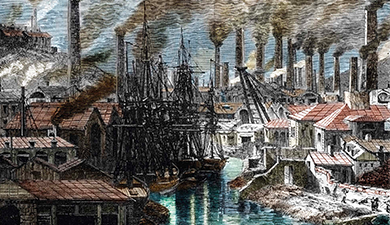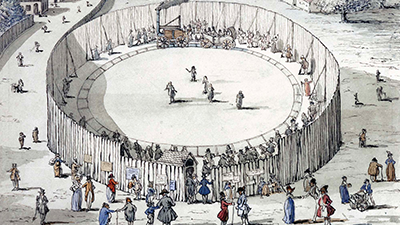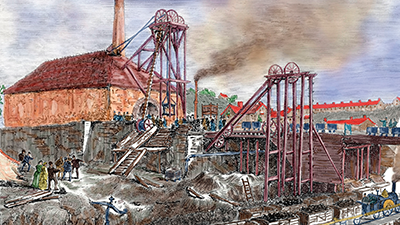The Industrial Revolution
Teacher Resources
Driving Question: How did the Industrial Revolution begin and spread to new regions of the world?
The Industrial Revolution began in Britain and soon transformed the world. Fueled by coal and steam, new machines changed how people worked, produced goods, and built cities. In this lesson, you’ll explore how and why industrialization started where it did, how it spread to other regions, and how it reshaped economies, societies, and environments along the way.
Learning Objectives:
- Evaluate how the Industrial Revolution changed human communities and societies during this era.
- Analyze images to assess how industrialization impacted communities and production and distribution.
Vocab Terms:
- capitalist
- colonies
- consumer
- manufacturing
- pollution
- proletariat
- resource
Opener: The Industrial Revolution
To teach this lesson step, refer to page 3 of the Lesson 7.5 Teaching Guide.
Consider using Three-Step Reading with students to “read” visuals: First, get the big picture. Then, zoom in on details. Finally, think about what the image means. Page 3 of our Reading Guide spells it out.
In this quick opener, use a painting from 200 years before the Industrial Revolution as you imagine life in a preindustrial world.
Building Cities
To teach this lesson step, refer to page 3 of the Lesson 7.5 Teaching Guide.
The Urbanization Game isn’t just an OER Project favorite, but a world history teacher favorite. One teacher discusses a recent OER Urban Game Redesign, while others discuss the Urban Game more generally.
If you’ve ever spent time in a city, you know that they’re bursting with, well, everything! Loads of buildings, people, cultures—all in one place. This game will help you explore how cities have changed our landscape—both physically and culturally.
Origins of Industrialization
To teach this lesson step, refer to page 6 of the Lesson 7.5 Teaching Guide.
Make sure all your students have the supports they need to be successful! Find a variety of approaches in the OER Project Differentiation Guide.
Coal helped propel England to the forefront of industrialization. It also propelled the steam engine. These resources will help you understand how and where the Industrial Revolution started.
-
Guiding Questions
-
Before you read
Preview the questions below, and then skim the article. Be sure to look at the section headings and any images.
While you read
Look for answers to these questions:
- What was the initial reason that people in Britain started mining coal?
- How did the fact that wet conditions made British coal hard to get to turn into an advantage for Britain?
- Why did the Industrial Revolution spread out of Britain?
- What were some consequences of the Industrial Revolution?
After you read
Respond to this question: Which of the impacts of industrialization covered in this article are still apparent in today’s world?
-
Guiding Questions
-
Before you watch
Preview the questions below, and then review the transcript.
While you watch
Look for answers to these questions:
- How did coal and other environmental factors help Britain industrialize first?
- How did England’s preindustrial wool industry help it industrialize?
- How did Britain’s financial system help launch new industrial ventures?
- How might have high wages in Britain contributed to industrialization there?
- What global factors may have fed Britain’s industrialization?
After you watch
Respond to this question: Which one factor listed in this video do you think was the most significant in helping Britain industrialize first?
Key Ideas
Industrialization Spreads
To teach this lesson step, refer to page 8 of the Lesson 7.5 Teaching Guide.
The Three-Step Reading Worksheet provides great support for your students as they read these articles.
Industrialization didn’t stay in Britain. These materials examine how it spread to new regions and transformed economies, environments, and societies on a global scale.
-
Guiding Questions
-
Before you read
Preview the questions below, and then skim the article. Be sure to look at the section headings and any images.
While you read
Look for answers to these questions:
- What geographic features helped Britain industrialize?
- What geographic features slowed industrialization in China and Japan?
- What social conditions in Britain supported early industrialization?
- How did slavery contribute to the rise of industrialization?
- What global advantages helped Britain industrialize beyond plantations?
After you read
Respond to these questions: Was local or global context more important in explaining Britain’s early industrialization? Which historical frame helps support your view?
-
Guiding Questions
-
Before you read
Preview the questions below, and then skim the article. Be sure to look at the section headings and any images.
While you read
Look for answers to these questions:
- How did industrialization change family life in Britain?
- What roles did women and children have in the industrial workforce?
- What opportunities or benefits did industrialization create for people in Britain?
- How did industrialization affect the lives of people in colonized regions?
- How did the demand for wheat connect Britain to other parts of the world?
After you read
Respond to these questions: If you moved from a farm to a city for factory work, how would your life change? What might be better or worse?
Images of the Industrial Revolution
Closer: The Industrial Revolution
To teach this lesson step, refer to page 11 of the Lesson 7.5 Teaching Guide.
Use this Claim and Focus Worksheet to support students in their claim making!
Historians make a lot of claims about the Industrial Revolution. It’s time for you to practice making your own claims as you consider why industrialization started in Britain before it spread around the world.
Engines and Infrastructure
To teach this lesson step, refer to page 12 of the Lesson 7.5 Teaching Guide.
Check out how railroads and clean water systems helped carry industrialization into new places while reshaping cities, health, and human connections along the way.
-
Guiding Questions
-
Before you watch
Preview the questions below, and then review the transcript.
While you watch
Look for answers to these questions:
- What were some of the issues with drinking water in Britain?
- What system did Thomas Hawksley pioneer?
- Why was the steam engine an essential part of making clean water?
- How did the changes in the production and distribution of drinking water impact the population of Nottingham?
After you watch
Respond to this question: What might be some long-term consequences of improved sanitation?
Key Ideas
-
Guiding Questions
-
Before you watch
Preview the questions below, and then review the transcript.
While you watch
Look for answers to these questions:
- How did widespread railways help bring the Industrial Revolution to more people?
- How did railroads shape our ideas of space and time?
- What were some arguments that people in the long nineteenth century used against railroads?
- What effect did industrialization have on our worldview about progress?
- In what ways is the Internet similar to the railroad?
After you watch
Respond to these questions: Do you agree that railroads changed the way that humans think about time and space? Why or why not?

























